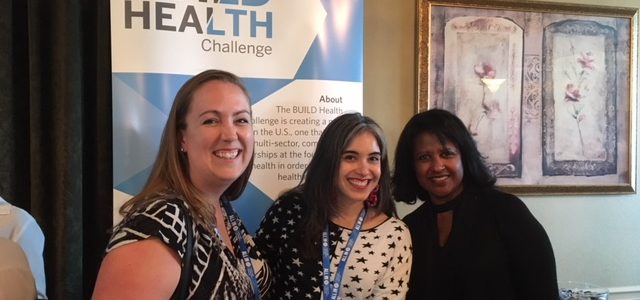 Improving health for all will require intentional disruption of the systems that lead to inequities and poor health outcomes, according to leaders at the All In National Meeting September 11-12th in Denver, CO. The event brought together members of the online group All In Data for Community Health network, made up of individuals and organizations–including BUILD Health Challenge awardees–who are improving community health through multi-sector data sharing and collaboration.
Improving health for all will require intentional disruption of the systems that lead to inequities and poor health outcomes, according to leaders at the All In National Meeting September 11-12th in Denver, CO. The event brought together members of the online group All In Data for Community Health network, made up of individuals and organizations–including BUILD Health Challenge awardees–who are improving community health through multi-sector data sharing and collaboration.
Three plenary sessions in particular underscored the necessity of bold and innovative partnerships and data collaborations to improve community health.
Dr. Somava Stout, MD, MS, executive lead of 100 Million Healthier Lives, challenged attendees to disrupt systems that perpetuate chronic health inequities. The initiative brings together more than 1,000 partners in 28 countries to achieve transformation in health, well-being and equity, with an audacious aim of 100 million people thriving globally by 2020.
Dr. Tiffany Manuel, PhD, who leads collection and dissemination of data and information across the affordable housing industry for Enterprise Community Partners, Inc., presented a compelling case for disrupting the way that professionals traditionally communicate data and solutions. To be effective communicators and invite other sectors into public health, rather than alienate them, she recommended using messaging that inspires trust, drives collective action, and clearly conveys the benefits of addressing gaps in health equity.
Dr. Rishi Manchanda, MD, MPH, president and CEO of HealthBegins and a physician who describes himself as an “upstreamist,” spoke to the challenges and potential tools to address root causes of poor health from the clinical and community perspective. He noted there is no playbook to follow for much of the work that addresses upstream root causes of health for clinicians or communities. While a doctor’s office might make a referral for a patient with a specific health condition, there is not yet a comparable referral for a patient who lacks affordable housing, or a patient who lives in an area with high incidence of violence.
Partners that have joined together to facilitate the All In peer-to-peer learning environment include the BUILD Health Challenge, Data Across Sectors for Health, New Jersey Health Initiatives, Population Health Innovation Lab, and the Public Health National Center for Innovations.
In addition to the plenary sessions on health equity, the meeting also offered workshops and breakout sessions on innovative efforts and trends in data sharing.
Words like “innovation” and “disruption” can be empty without real-world examples of how local partners are changing systems in ways that actually improve health, and several sessions offered promising solutions:
- Community outreach is being used successfully to expand and implement the healthy homes visiting program in New Brunswick, N.J.
- Community data and resident input were explored to work on improving green space equity in the Old Brooklyn neighborhood of Cleveland, Ohio.
- A partnership in New Orleans is using a novel data source of 211 calls as a measure of food insecurity by zip code.
- The Garrett County Health Department in Maryland is using, and piloting in additional communities, a digital commons to expand resident engagement.
Even more than before the meeting, participants were “All In,” and were inspired to continue to take advantage of the All In community to advance their efforts in community health.
The All In free resources are available here.
Rachel Locke, MPH, CPH, is the ASPPH Public Health Philanthropy Fellow at the de Beaumont Foundation. She recently graduated from the Columbia University Mailman School of Public Health’s Environmental Health Department with a Certificate in Toxicology.




